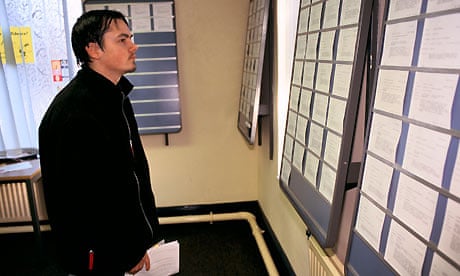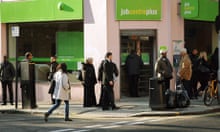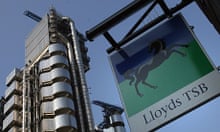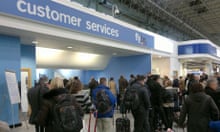Britain is heading for a fifth year of falling living standards, with official figures showing a decline in average earnings growth last year from 1.7% to 1.4%.
Unemployment fell and the number of people in work reached a record level in the three months to last November, but employers kept a lid on pay rises.
Economists warned that with inflation at 2.7% and likely to stay above 2%, workers faced a squeeze on their finances that would send more retailers to the wall and restrict the economy's recovery.
The gloomy prognosis was underlined by plans from Lloyds Bank and regional airline Flybe to shed over 1,200 jobs. After the HMV, Comet and Jessops closures and a sharp decline in manufacturing over recent months, the government is braced for figures on Friday that are expected to show the UK halfway towards a triple-dip recession. Unions criticised Lloyds, which they said had announced 1,300 job cuts in the past few days and a quarter of its workforce since 2009.
Ministers welcomed the unemployment figures, which also showed a further dip in the numbers claiming jobseeker's allowance. Employment minister Mark Hoban said: "These are very positive figures showing employment rising for over a year and, despite difficult economic circumstances, unemployment is lower than when this government took office.
"It's good to see long-term unemployment falling and the number of young people claiming jobseeker's allowance dropping again, while the increase in vacancies shows there are jobs out there.
"But we are not complacent, and will continue making sure we give jobseekers the support and training they need to achieve their goal of returning to work."
Liam Byrne, shadow work and pensions secretary, argued the figures "show no roaring recovery, they show very shaky foundations". He added: "Half of the country saw yet another rise in unemployment, nearly half a million people have been on the dole for more than a year and youth unemployment rose."
The unemployment rate dropped to 7.7% from 7.8% in the three months to November as the UK jobs market showed some resilience while the economy weakened.
The Office for National Statistics said there were 2.49 million people unemployed, down 37,000 between June and August 2012 and down 185,000 on a year earlier. It is the lowest since spring 2011. A record number of people were also in work last year after a boost to full-time and part-time working. Almost 30 million adults – the highest number since records began in 1971 – were employed in the quarter to last November, up by more than half a million on the previous year. That gives an employment rate of 71.4%.
But economists warned that the downturn in the manufacturing sector in the runup to Christmas and the bloodbath on the high street would reverse the trend in the coming months.
Labour market data is seen as a lagging indicator of the economy's health and there are many predictions that unemployment will begin to rise this year after an 18-month run of declines.
Rob Carnell, UK economist at ING, described the prolonged fall in unemployment as "a miracle" ahead of a likely triple-dip recession.
The first estimate for GDP in the final quarter of last year will be published on Friday and is expected to show the economy contracted. Some economists are forecasting a fall of 0.4%.Carnell said: "Weaker public finance data for December and further retail sector failures suggest that this strength could be challenged in the months ahead."
Samuel Tombs, UK economist at Capital Economics, said pay growth remains weak, with the headline rate of average earnings growth excluding bonuses 1.4%, the lowest rate for two and a half years. "Real pay is therefore still falling at an annual pace of more than 1%."
Neil Carberry, CBI director for employment and skills, said: "Pay restraint has played an important role in preserving jobs and, with growth in average weekly earnings remaining subdued at 1.5%, it's clear that this is a trend that continues."
TUC general secretary Frances O'Grady said: "These figures make welcome reading but, with the economy still flatlining, it is hard to see how these trends can continue. The rate at which employment is increasing has started to fall and we won't see a sustained recovery in the jobs market until our economy starts to grow."
Lloyds said the job losses in group operations, insurance, retail, wealth and international and commercial divisions followed a strategic review. "The group's policy is always to use natural turnover and to redeploy people wherever possible to retain their expertise and knowledge within the group. Where it is necessary for employees to leave the company it will look to achieve this by offering voluntary redundancy. Compulsory redundancies will always be a last resort."
Unite national officer Dominic Hook said: "Since 2009 Lloyds have slashed a quarter of the workforce. It is a complete disgrace that the bank, which is 41% owned by the taxpayer, continues to cut jobs in such a cavalier manner."




